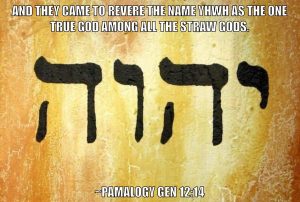GENESIS
XII
straw gods surrounding Canaan
1And the straw gods of the Egyptians numbered in the thousands and preceded the straw gods of Olmec and their Shamans. 2And the one called the father of the Hebrews, Abram, is said to have wandered there because of a famine after he was sent by the one true God, Elohim, away from Ur of Babylon to Haran between Ai and Bethel where he built a temple before he chose to settle in Canaan. 3And the details are available in their sacred writings to this day.

4And the Hittites were called the people of a thousand gods. 5For they assimilated all of the gods of the land as they conquered them in the age when Assyrians were weak from war against Babylonians and the Egyptians were preoccupied with their own affairs. 6And the territory of the Hittites spread throughout Anatolia West of Turkey to Syria. 7And the kings of the Hittites made treaties with the kings of Babylon, Assyria and Egypt and worshiped their gods. 8Therefore there was no place on Earth with more straw gods than the land of Canaan, which was between all of these lands and served as a biway.
emergence of YHWH
9And according to the Hebrews it came to pass that the children of Abram multiplied in the land and their descendants were liberated from their oppressors. 10And they commemorated their liberation from bondage with religious festivals based on lunar and seasonal cycles and a seven day week. 11And they attributed their liberation to a man Moses, whom they said was one of the descendants of Abram and gave them their Law.
12And the many gods were called Elohim. 13And they worshiped Elohim until their liberators persuaded them to worship only one deity, YHWH. 14And they came to revere the name YHWH as the one true God among all the straw gods. 15And they were taught that YHWH was likewise the only god worshiped by their forefather Abram and his son Isaac and Isaac’s son, Jacob. 16And they revered the writings they attributed to Moses and the legends of the origin of their nation, Israel, as the descendants of these patriarchs. 17And their writings retained the name Elohim, which is a general term for deities. 16And they regarded Elohim as one God even though the word Elohim is plural.
time variants in Hebrew scriptures
17And their writings were compiled over a number of centuries and the copies of them were corrupted by scribes so that the date of creation and the time in which they recorded their ancestors had lived was changed. 18And after the Greeks came to power over them, having previously been subject to the Persians, who had freed them from the Babylonians, they translated their sacred writings into Greek for the Alexandrians in the age of the Ptolemies. 19And some of the Christians who came after them believed that their Greek translation of their Hebrew, Chaldee and Aramaic texts reflected a more ancient copy than the Hebrew that the Jews continued to copy.
20And thus the first created man, Adam, in their Greek copy gave birth to a son, Seth at the age of 230. But in the later Hebrew copies Seth was supposedly born when Adam was 130. 21And one hundred years appeared to have been subtracted for several of the descendants of Seth in a similar fashion and with other variations by one of their scribes in the days before the Christian era, when the Greek copy, which was called the Septuagint, was made. 22And the difference in the time from Adam to the Christian era was about 1450 years total between the Greek Septuagint and the Hebrew preserved in the Christian era by the Masoretes in the time of Maimonides. 23And the Masoretic Jews claimed that a Greek translator added years. 24They were not subtracted, they held, while the Byzantines and the Latins thought the opposite.
Septi Millennialism
25And it came to pass that the first Christians, including Jesus himself, used the Greek copy of the Hebrew scriptures. 26And one calling himself Barnabas wrote an epistle in Greek, one of the most ancient preserved by Christians. 27And this Barnabas wrote about the destruction of the Jewish temple, which took place in 70 CE while Trajan was Caesar so some supposed this Barnabas must not have been the same Barnabas who accompanied the apostle, Paul because of its accurate prediction. 28And this same Barnabas anticipated the return of Jesus to reign on Earth with peace for one thousand years after six thousand years from the creation of Adam. 29And this belief was called Septi Millennialism. But later Christians called it Chiliasm and a heresy. 30For those later calling themselves Orthodox and Catholic rejected the belief that Jesus would reign on Earth in any worldly kingdom in any way that he did not already reign.
<< PGen Ch11<< || PGen Index|| >>PGen Ch13>>
